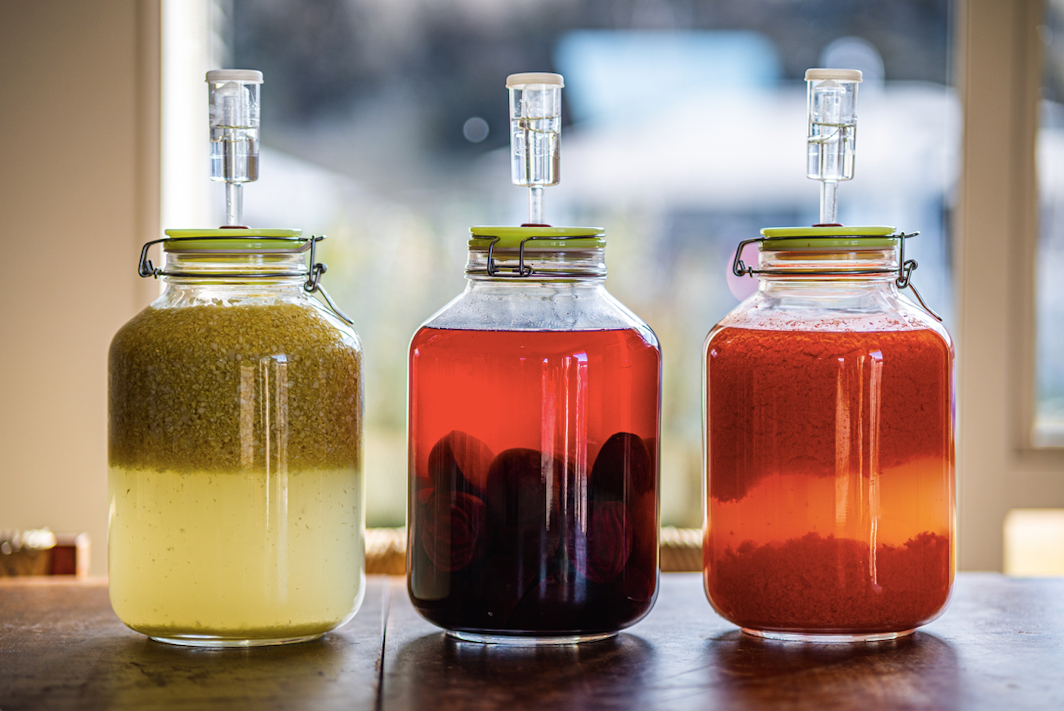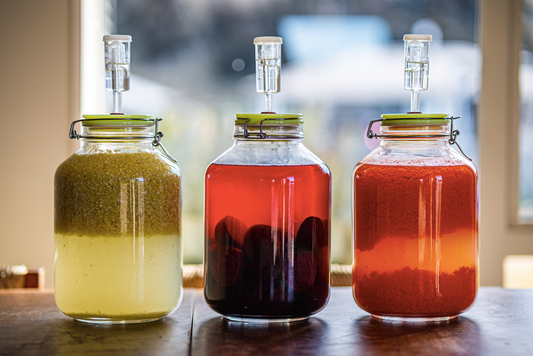The collective rise of awareness when it comes to gut health and fermented products has been a major shift over the last five years. Products like kombucha and other fermented drinks and sources have experienced a massive surge in popularity, and are now available in most mainstream food stores and outlets - rather than being buried away in health food shops and touted as ‘alternative’.
This shift goes hand in hand with the now widespread understanding that maintaining a healthy gut is an investment in both our physical and mental health (which for the most part is an amazing thing).
However, like every health movement that gains popularity in a short amount of time, the phenomenon of “everyone’s an expert” and too much readily available (and often conflicting) health advice, can lead to confusion about where on earth to start with your gut journey.
I’ve definitely been there myself and have fallen down the research rabbit hole multiple times- as well as forking out for expensive supplements that promise the world, but are essentially overpriced nutrients - nutrients that we can get in more natural forms from the foods we eat!
In this blog, we are going to delve into Kvass, which is what our beautiful Clover Ferments tonics are, and how the tonics stack up against the ‘K brigade’ - kombucha, kimchi, kefir and other probiotics sources. Ultimately, every one of us has different needs when it comes to our gut health journeys, which is something we feel hugely passionate about. So, let’s take a look at what the latest research says on different fermented products, and see if we can answer some of those burning questions.
First of all - What is Kvass?
Our hero Kvass is classified as a traditional natural fermented drink with an incredibly rich history - originating from Babylon over 5,000 years ago! From here Kvass spread to Byzantium and parts of Eastern Europe and Scandinavia.
Over the years, kvass has been made from a variety of ingredients, such as fruits, vegetables and grains.

Our Clover Ferments Kvass range is made from Beetroot, Cabbage and Carrot (individually). Taking our Beetroot kvass as an example, it is essentially an infusion of beets, salt, and water, fermented by wild yeasts in the air - and that’s it for the ingredients.
The other probiotic contenders:
Some of the most popular probiotic drinks include Kombucha, Kefir, and Kvass. Each fermented drink provides an assortment of enzymes, probiotics, and other health-boosting agents to the body.
While these beverages are sold in many stores, they are also easy to prepare at home. Kimchi is a probiotic food that has gained priority. In a nutshell:
Kombucha – A tangy, slightly sweet drink (sometimes with fizz), is known for its powerful antioxidant properties. It is also rich in Vitamin C. Kombucha is known for protecting cells against inflammation and other damage, boosting the body’s immune system, and detoxifying the liver. However, Kombucha can contain high levels of sugar (although this is dependent on the way it is prepared)
Kefir – Kefir is a fermented milk drink that uses a blend of yeast and bacteria. This drink has a tangy taste and is filled with helpful probiotics. It is a rich source of calcium, protein, and B vitamins. Kefir is often used in smoothie blends but can be enjoyed on its own.
Kimchi - This spicy fermented food is rich with historical roots in South Korea. The vitamins, minerals, and antioxidants in kimchi can provide important health benefits. Choline, which is found in kimchi, is a natural compound vital for maintaining your cells, your muscles, your nervous system, and even your mood. Kimchi also includes Vitamin A, C and K and aids in digestion, heart health and immune support.
What are the core benefits of Kvass?
Although each individual tonic has slightly differing benefits based on the base vegetable, Kvass’ benefits are known for improving digestion, repairing leaky gut strengthening the immune system, reducing blood pressure and being detoxifying. The tonics are full of “good” bacteria. These are live microorganisms that can provide health benefits when consumed.
Looking at beet kvass, for example, the tonic harnesses the power of lactic acid and can improve lactose digestion, play a role in preventing and treating diarrhoea and act on the immune system, helping the body to resist and fight infection. It is also an excellent source of probiotics, Vitamin C and Vitamin B9. We could discuss the benefits of Kvass all day, but this is a general overview.
An unsung hero by the name of Glutamine
Our Kvass’ also contains high doses of essential amino acids and Glutamine.
Amino acids (commonly found in meat products) are an essential part of helping to repair the intestinal wall. Glutamine is the key amino acid for avoiding inflammation and repairing leaky gut. Glutamine is crucial for immune cells and digestive health and is found naturally in cabbage and beetroot.
Cabbage juice has been used as far back as the 1940s to treat stomach ulcers and there are other studies that have shown it helps to heal the gut lining. Research also shows that glutamine has clear links to improving sleep quality and is considered a natural sedative to the brain - leading to much more restorative sleep.
Putting Kvass head-to-head with Kombucha
We’ll admit it from the outset - we are biased in our love for Kvass, but we’ll put that aside in favour of an honest discussion and see how it stacks up against Kombucha.
The kombucha craze is real and it is the fermented beverage that has the most hype surrounding it. The real question is; does kombucha live up to this hype in terms of health benefits? The selling point about kombucha is that because it’s fermented, it contains beneficial microbes that may help colonize the gut. As we know gut health not only affects our digestion, it’s directly linked to our cognitive function, immune system, and mood.
But the truth about kombucha is we don’t know for sure if it’s even good for the gut. As this study from just last year, published in Nutrients points out, “[T]here are no studies of the effects of kombucha on gastrointestinal health and microbiota in humans”.

Looking at Kvass - first, off the bat, the taste most certainly does not disappoint! If you’ve tried any type of fermented beverage in the past, like kombucha, you’ll probably be familiar with the vinegary and slightly acidic taste.
Another reason why we love kvass is that it’s low in sugar and doesn’t contain any sweeteners, unlike many other fermented beverages, like kombucha. Kvass also contains more probiotic cultures than kombucha (billions vs millions). This is due to the difference in fermentation processes, which allows the bacterial cultures in kvass to stay healthy and alive in a sealed bottle.
How do we make Kvass?
Anaerobic fermentation is the method we use at Clover Ferments; this way of fermenting means there is an airlock on top pushing out the natural gases made in fermenting and not allowing any oxygen into the jar. This process lowers the histamine created in the fermentation process, unlike other fermented foods which could possibly be triggering to a sensitive digestive system.
And the winner is….
Moderation.
All fermented and probiotic products have their unique traits, benefits and drawbacks, which are important to be aware of - but moderation is the most important takeaway.
We created Clover Ferments tonics as we were looking for a natural, simple, potent - in terms of health benefits - product, that was appropriate for adults and babies to consume daily and be able to reap the benefits health-wise.




